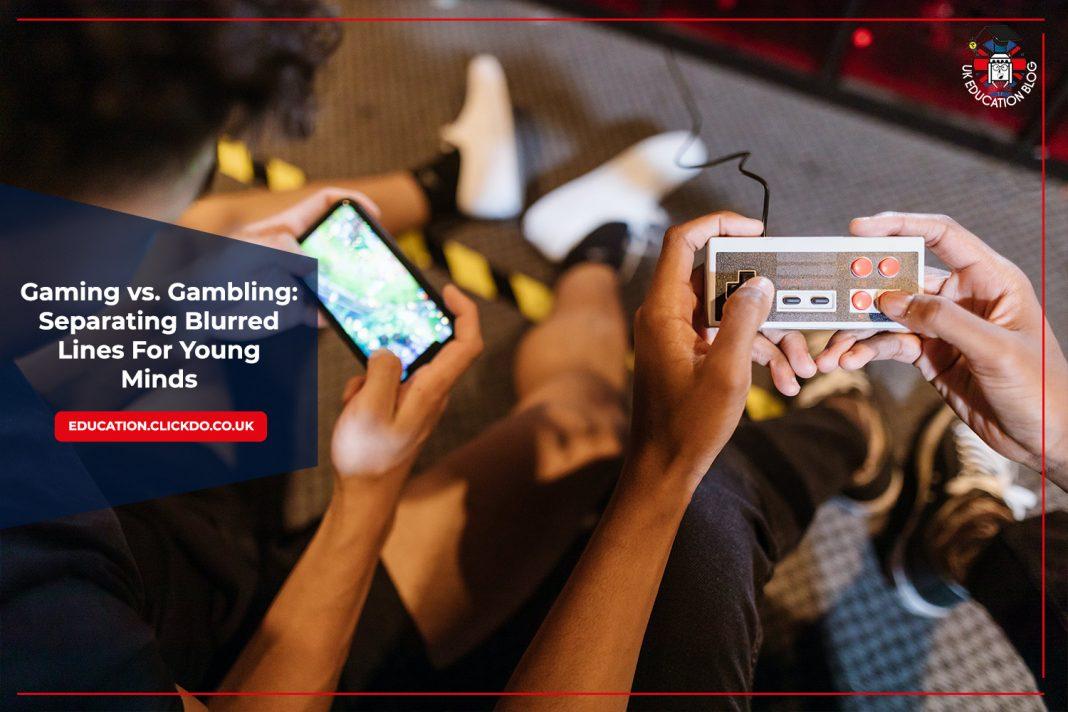The rise of digital entertainment has blurred the lines between gaming and gambling.
Activities that once stood apart, now converge in various ways. With video and online games featuring loot boxes and casinos introducing gamified elements, it can be challenging for young minds to distinguish between them.
The critical difference to remember is that gaming is an act of playing electronic games, purely for entertainment. On the other hand, gambling involves wagering money or something of value on an event with an uncertain outcome, as one might find with online casinos in the UK.
While this simple explanation might seem sufficient, the practical separation can be significantly more complex.
Blurred Lines: Navigating the Gaming-Gambling Intersection
This blending of gaming and gambling can manifest in numerous forms, such as ‘skins’ in games with real-world monetary value, or smartphone games with casino-like mechanics. The convergence can be particularly tempting for young individuals who are drawn to the excitement and risk associated with gambling activities without being old enough to understand the consequences fully.
For parents and guardians, it is vital to understand both the appeal and the risks. Open conversations about the reasons why games are enjoyable, and the limits of engagement with them can be educational and preventive. Establishing boundaries and monitoring play can help keep gaming a healthy and enjoyable pastime rather than a risky venture.

Educational initiatives also play a role in separating these lines. Schools and educational programs can provide workshops and courses outlining the differences between gaming and gambling. They can also teach about the value of money and the risks of addiction, thereby equipping young minds with the knowledge they need to navigate the digital world safely.
Ultimately, the most significant line of defence against the potential blending of gaming and gambling in young minds is awareness and open dialogue. By maintaining an environment where the excitement of gaming and the risks of gambling are both acknowledged and discussed, young people can enjoy the fun of digital games while staying clear of the pitfalls of gambling.
The Playful Matrix: Manoeuvring Through Digital Landscapes

It’s no secret that digital games have skyrocketed in popularity, especially with the technological advancements that allow for immersive experiences. Amidst this virtual playground is a particular type of online engagement, one where the stakes are higher than digital coins or in-game rewards.
We’re talking about online casinos in the UK, venues where the lines between gaming for fun and online gambling for real-world money begin to blur. It’s crucial, now more than ever, to understand the unique characteristics and potential impact of these online gambling platforms, especially for the digital-savvy youth of today.
Impressionable Minds and the Allure of Virtual Bets

Young people are naturally attracted to games that stimulate their senses and give them a feeling of achievement. The allure of taking risks and potentially winning big is an exciting prospect that is not lost on this generation. But this excitement can sometimes lead them into the realm of online gambling, where the consequences are much more tangible.
The line between gaming for enjoyment and gambling can often become indistinct, particularly when real currency is involved. It’s imperative that educators and guardians recognize the social implications of youngsters coming across gambling-themed elements in their online experiences and that they implement strategies to educate them on the value of money and the realistic outcomes of gambling.
Empowering Education: A Safe Bet For Informed Decision-making

Educational institutions have a pivotal role to play in preparing young minds to navigate the complex world of digital entertainment responsibly. Integrating lessons on digital literacy into the curriculum can equip learners with the tools they need to make informed choices. By bringing attention to the markers that distinguish innocuous gaming from online gambling, teachers can help students develop critical thinking skills that will serve them not just in assessing digital games, but in all aspects of safe internet use. Resources like educational websites provide invaluable support for this mission, offering clear guidelines and practical tips for fostering healthy online habits in and out of the classroom.
Drawing those lines and instilling a sense of responsibility regarding online activities, including gaming and gambling, requires a concerted effort from both the education sphere and the home environment. As we move forward, understanding and communication between educators, parents, and the youth will be the key players in ensuring that this digital generation can enjoy the vast world of online entertainment without falling into the traps of gambling irresponsibly.
Author Profile

- Shirley Owen is a blogger and writer who enjoys writing blogs on education, technology and general news. An avid reader, she follows all the latest news & developments to report on them through her articles.
Latest entries
 learningDecember 22, 2025When Co-parenting Affects School Performance – Challenges & Solutions
learningDecember 22, 2025When Co-parenting Affects School Performance – Challenges & Solutions educationDecember 11, 2025Making Education Accessible for Mobile Families that Travel
educationDecember 11, 2025Making Education Accessible for Mobile Families that Travel learningOctober 28, 20257 Daily Classroom Strategies Helping Children With Learning Differences Thrive
learningOctober 28, 20257 Daily Classroom Strategies Helping Children With Learning Differences Thrive  educationSeptember 18, 2025A Guide to the European Accessibility Act for Schools and Universities
educationSeptember 18, 2025A Guide to the European Accessibility Act for Schools and Universities







